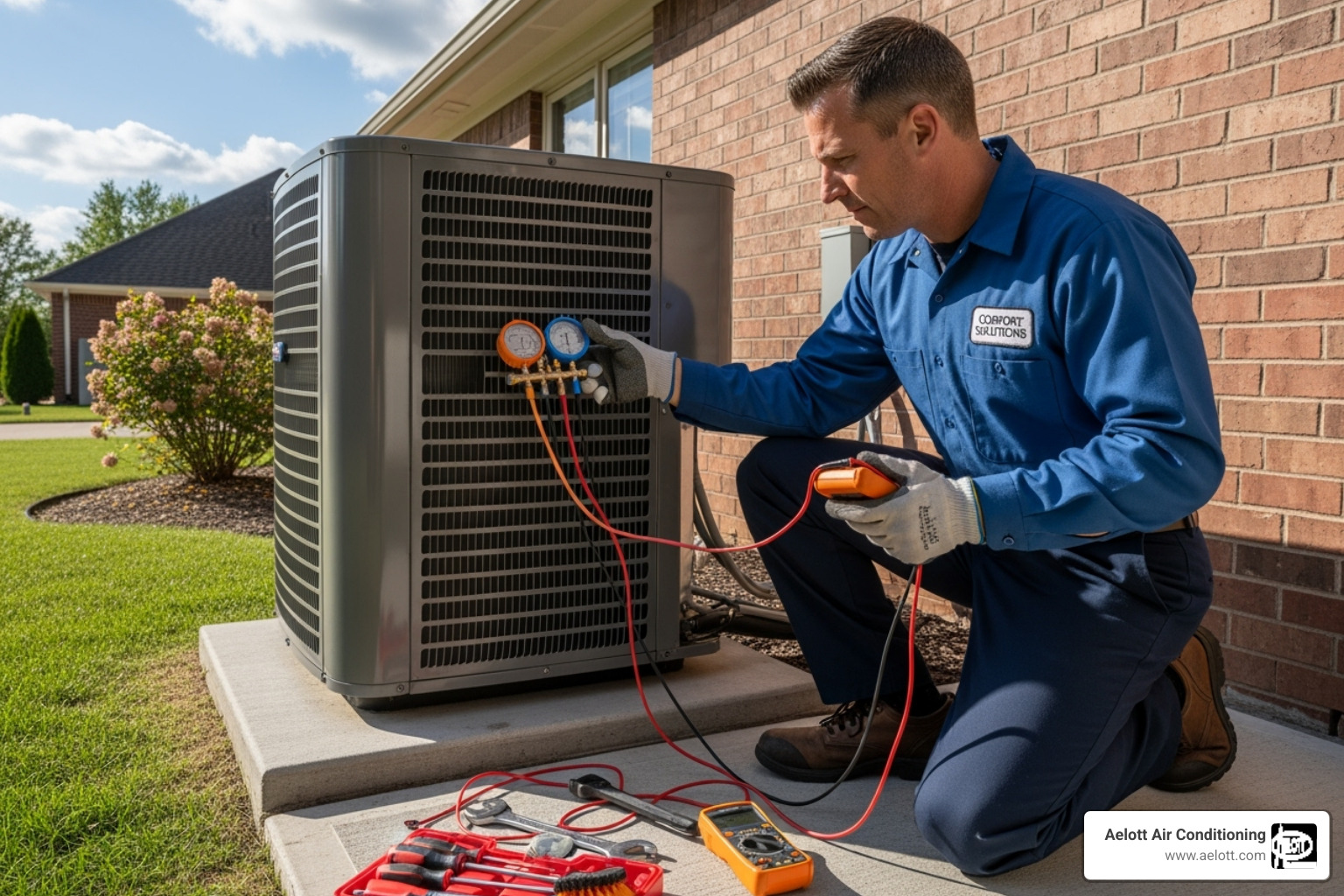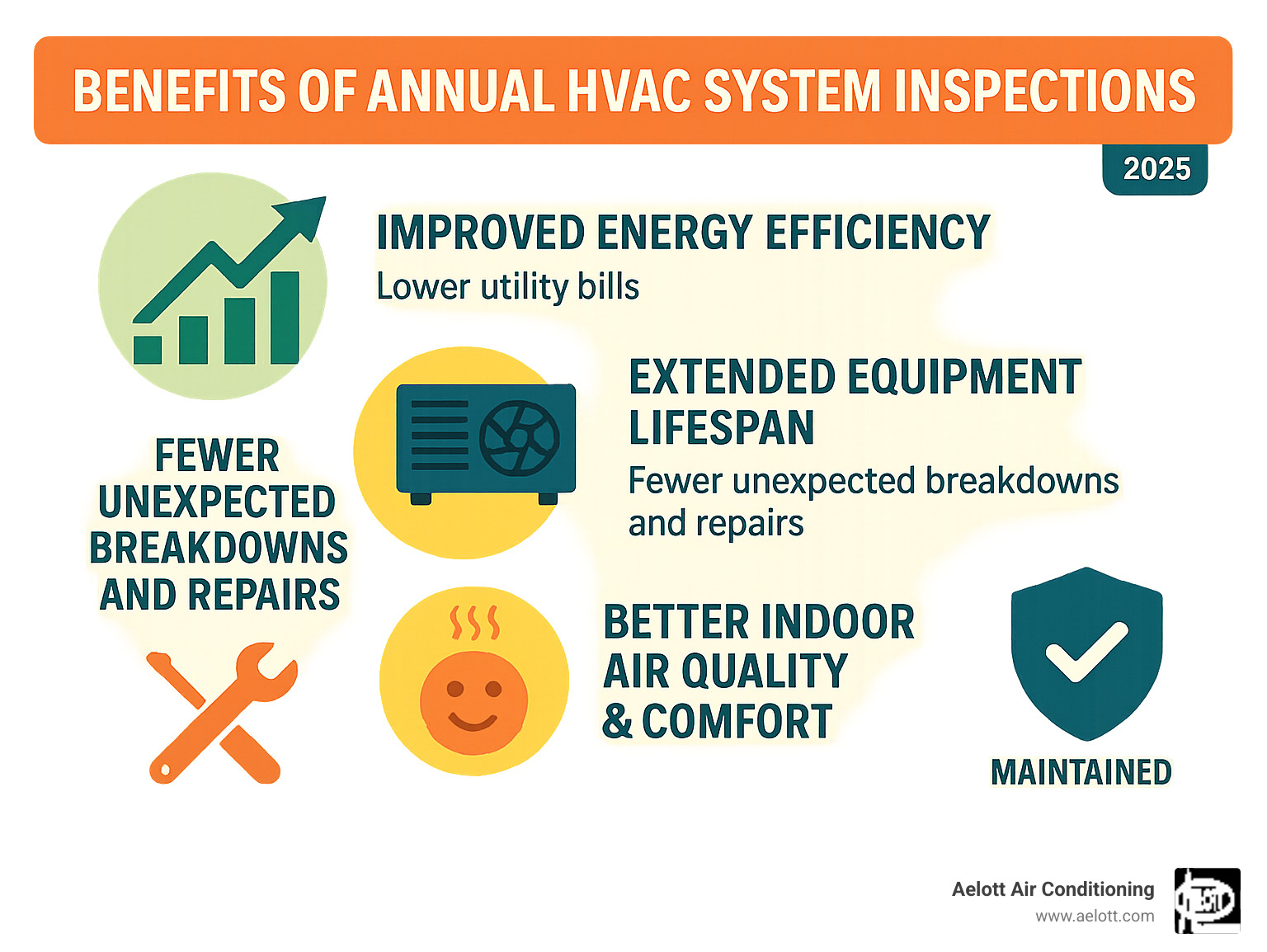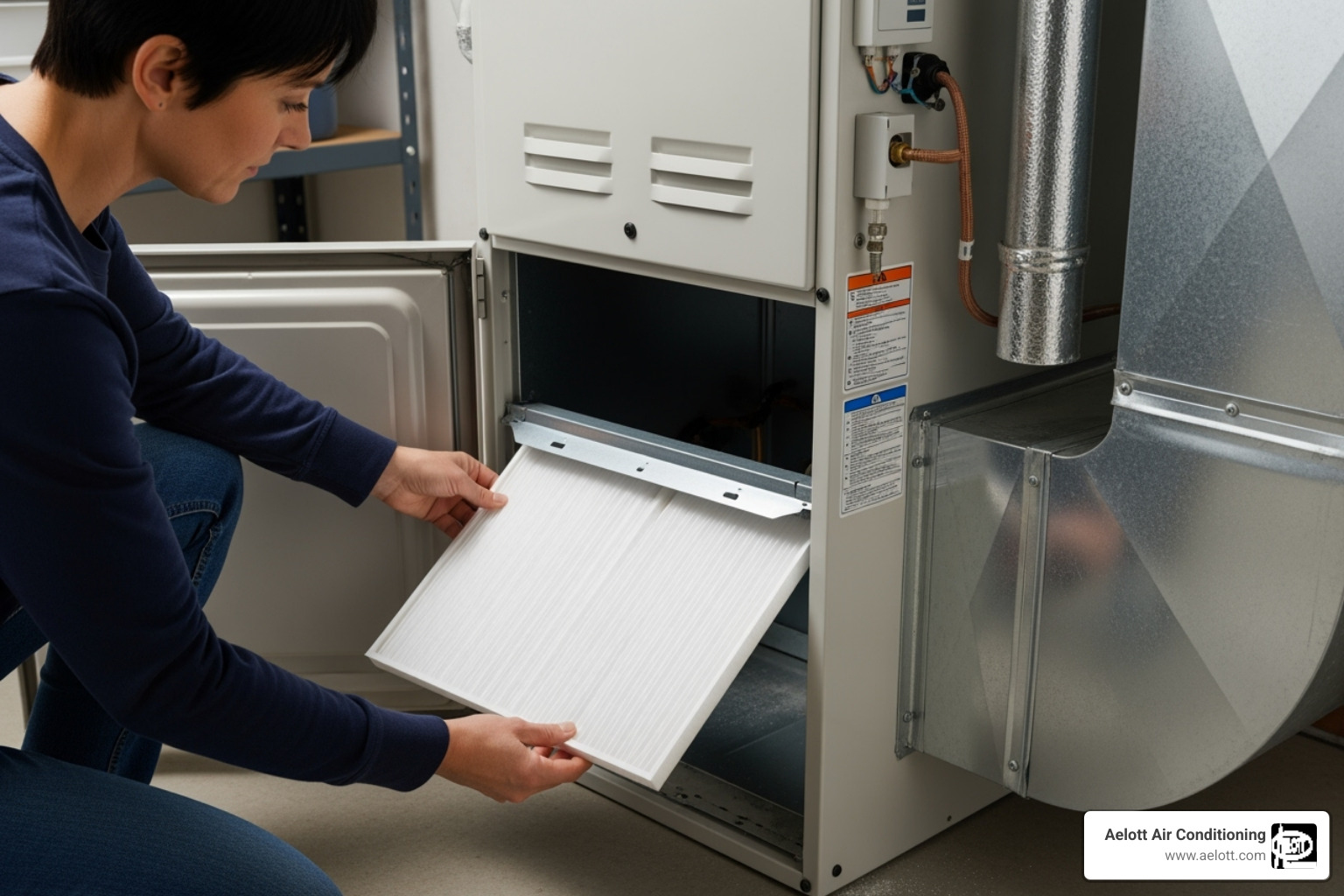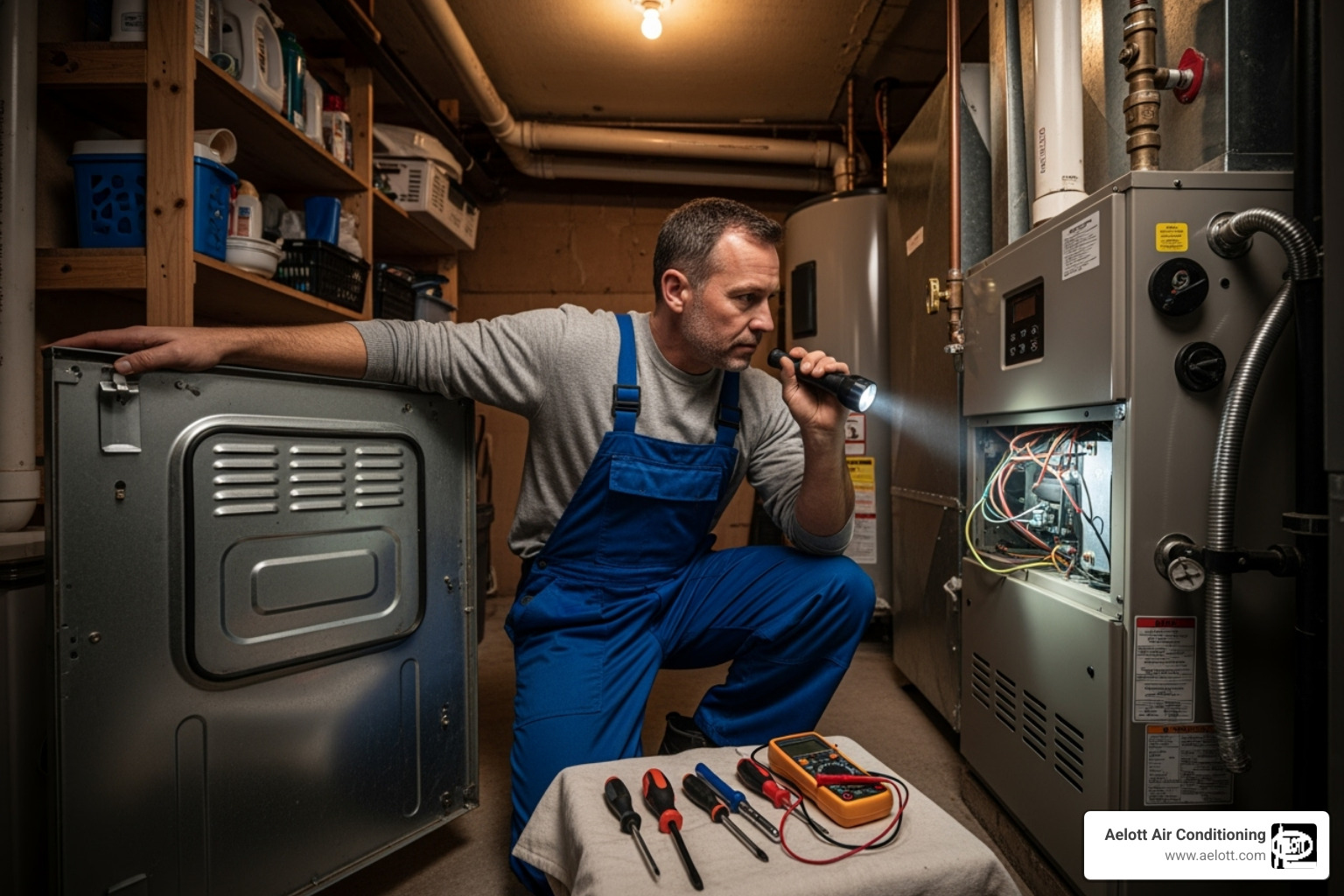.webp)
.webp)
Don't Skip This: The Importance of Regular HVAC System Inspections
Discover why annual HVAC system inspection is crucial for comfort, savings & safety. Learn DIY tips & when to call pros.

Why Your Home Needs Regular HVAC System Inspections
An HVAC system inspection is a thorough evaluation of your heating, ventilation, and air conditioning equipment by a certified technician. Here's a quick overview:
What's Checked:
- Thermostat calibration and operation
- Electrical connections and safety controls
- Heat exchanger and combustion components
- Refrigerant levels and cooling performance
- Airflow and ductwork condition
- Condensate drains and ventilation systems
Inspection Types:
- Annual tune-up: Basic maintenance check ($80-$150)
- Comprehensive inspection: In-depth evaluation ($200-$450)
- Home buyer inspection: Pre-purchase assessment
Frequency: Once or twice yearly, typically in spring and fall
If you notice an unfamiliar smell or sound when you first turn on your system for the season, it's a sign it needs attention.
Most HVAC system failures happen when you need your equipment most—during the hottest summer days or coldest winter nights. Regular inspections catch small problems before they become expensive emergencies.
While only 30% of Americans get regular HVAC inspections, this preventative maintenance improves energy efficiency and prevents costly breakdowns. A well-maintained system runs more efficiently, lasts longer, and ensures year-round comfort.
Professional inspections also ensure safety. Critical issues like cracked heat exchangers or gas leaks can pose serious health risks if left undetected.

What is an HVAC Inspection and Why is it Crucial?
An HVAC system inspection is a comprehensive health check for your home's heating, ventilation, and air conditioning system. A certified technician assesses your equipment's condition, cleanliness, performance, and safety features to ensure it runs reliably and keeps your family safe.
For homeowners in Escondido, Carlsbad, and surrounding areas, this check-up is vital. Your HVAC system is the heart of your home, controlling comfort and air quality. Neglecting it can lead to breakdowns, discomfort, and safety risks. A yearly HVAC system inspection significantly reduces repair costs, lowers energy consumption, and improves indoor air quality.
HVAC manufacturers design their products with annual maintenance in mind, as parts wear down and dust accumulates over time. Without regular check-ups, your system works harder, leading to blockages and inefficiency. This is why most warranties require proof of professional maintenance. An HVAC system inspection provides peace of mind by catching minor issues before they become major, expensive problems. It gives us a clear picture of your system's health—its age, cleanliness, and overall condition—allowing for proactive repairs.
In short, regular HVAC system inspections are key to maintaining comfort, efficiency, and safety. They reveal your system's true condition, preventing surprise breakdowns when you need your AC or furnace most. If you've noticed any red flags like odd sounds or smells, as detailed in our guide on The Top Signs Your Furnace Needs Maintenance, it's time for a professional check-up.
The Benefits of Annual Inspections
Investing in annual HVAC system inspections is a smart, proactive step that saves you money, boosts comfort, and keeps your home safe.
- Lower energy bills: A clean, well-tuned HVAC system runs more efficiently, using less energy and lowering your monthly utility bills.
- Fewer breakdowns: Most HVAC failures stem from neglect. During an inspection, we spot and fix minor issues—like worn parts or clogged drains—before they cause major breakdowns, ensuring you have reliable heating and cooling.
- Extended equipment lifespan: Like regular oil changes for a car, routine tune-ups keep your HVAC system running smoothly for years. By reducing wear and tear, we help you maximize the lifespan of your investment. A well-maintained furnace can last up to 20 years.
- Improved home air quality: Your HVAC system circulates all the air in your home. We ensure filters are clean, coils are free of mold, and ductwork is sealed to prevent allergens, dust, and other pollutants from spreading, creating a healthier indoor environment.
- Maintaining manufacturer warranty: Most HVAC manufacturers require proof of annual maintenance to keep your warranty valid. Skipping these check-ups can void your warranty, leaving you responsible for the full cost of major repairs.
How Inspections Boost Energy Efficiency and Air Quality
A professional HVAC system inspection directly boosts your home's energy efficiency and air quality by focusing on several key areas.
- Clean components: Dirty components like coils, burners, and blower motors force your HVAC system to work harder and use more energy. Regular cleaning during an inspection restores your system to peak efficiency.
- Optimal airflow: Blockages or leaks in your ductwork waste money. According to ENERGY STAR, leaky ducts can waste 20-30% of conditioned air. Our inspections identify and offer solutions for sealing these leaks, ensuring conditioned air gets where it needs to go.
- Calibrated thermostat: An improperly calibrated thermostat causes your system to run unnecessarily. We test and calibrate it to ensure it operates only when needed, saving energy.
- Reduced allergens and proper ventilation: We focus on reducing allergens and ensuring proper ventilation. We inspect and recommend regular replacement of air filters—your first defense against dust and pollen. We also clear clogged condensate drains to prevent moisture buildup, which can lead to rust, mold, and bacteria growth, ensuring the air you breathe is clean and healthy.
Professional vs. DIY: What's the Right Choice for You?
When your HVAC system acts up, it's tempting to try a DIY fix. While some basic maintenance tasks are perfect for homeowners, a comprehensive HVAC system inspection requires specialized knowledge and tools. Think of it like car maintenance: you can check the oil, but you'd leave an engine rebuild to a mechanic.

Understanding the difference helps you perform simple tasks to maintain your system while knowing when to call a professional for issues involving electrical components, refrigerant, or gas lines. At Aelott Air Conditioning, our HVAC Maintenance Oceanside CA services provide the expert care your system needs, ensuring both performance and safety.
Simple DIY HVAC Inspection Tasks for Homeowners
There are several straightforward tasks you can tackle yourself that make a real difference in your system's performance and longevity.
- Change your air filters: Change your air filters every 1-3 months. A clogged filter restricts airflow and forces your system to work harder.
- Keep your outdoor unit clear: Keep your outdoor condenser unit free of leaves, grass, and debris. Turn off the power at the circuit breaker, then gently clear away obstructions. A light rinse with a garden hose is fine, but avoid using a pressure washer, which can damage the fins.
- Check your thermostat: Test your thermostat by adjusting the temperature to ensure the system responds. Also, confirm it's set to the correct mode for the season (heating or cooling).
- Clean registers and vents: Regularly vacuum or wipe down your registers and vents to prevent dust buildup that can restrict airflow.
- Trust your senses: Look for water pooling near units, listen for unusual noises (grinding, squealing), and be aware of any "rotten egg" smells near a gas furnace. If you smell gas, evacuate immediately and call your gas company from a safe location.
When to Call a Professional
While DIY tasks are helpful, some issues require professional expertise for safety and to avoid further damage. Call a professional for:
- Electrical Problems: Frayed wiring, burning smells, or frequently tripping breakers are serious fire hazards that require an expert.
- Refrigerant Leaks: Handling refrigerant is regulated by federal law and requires certification. If your AC isn't cooling, has ice on the coils, or is hissing, call a technician.
- Gas Line Concerns: If you smell gas, evacuate your home immediately and call your gas company from a safe distance. Gas line and pressure checks must be done by a professional.
- Major Noises or Odors: Grinding, banging, or squealing often signal a failing component that needs expert diagnosis.
- Poor Performance: If your system has weak airflow, runs constantly, or short cycles (turning on and off frequently), a professional can diagnose the root cause. Learn more about this issue in our article on Why HVAC System Short Cycles.
HVAC Inspection vs. a Standard Home Inspection
When buying a home, a standard home inspection provides a basic overview of the HVAC system. The inspector will typically turn the system on and off, note its age, and look for visible damage. However, this is a surface-level check.
A professional HVAC system inspection is a deep dive performed by a certified specialist. We use diagnostic tools to check refrigerant pressures, test gas lines, inspect the heat exchanger for dangerous cracks, and evaluate motor performance. This detailed analysis uncovers hidden issues a generalist might miss.
This specialist inspection is crucial for older homes, like those in Valley Center or Fallbrook. A general inspector might say an old furnace works, while our evaluation could reveal it's inefficient or needs costly repairs. For homebuyers, a separate HVAC system inspection prevents costly surprises and provides valuable negotiating power.
The bottom line: A general inspection confirms the system works today. A professional HVAC inspection tells you how well it works, its expected lifespan, and potential future costs.
The Professional HVAC System Inspection Checklist: What's Included?
A professional HVAC system inspection is a comprehensive exam for your heating and cooling equipment. Our certified technicians use technical diagnostics, precision testing, and detailed cleaning to uncover hidden problems that could compromise your comfort and safety.

We evaluate both heating and cooling systems, checking for proper operation, cleanliness, and signs of wear to ensure year-round reliability.
Key Components Checked During a Professional HVAC System Inspection
During every professional HVAC system inspection, our technicians follow a systematic checklist:
- Thermostat: We ensure the thermostat accurately reads temperatures and communicates with the system to prevent energy waste.
- Electrical Components: We inspect wiring, contactors, and capacitors for wear and tighten connections to ensure safe, efficient operation.
- Blower Components: We clean and inspect the blower motor, wheel, and housing to ensure proper airflow.
- Condensate Drain Line: We check and clear the condensate drain line to prevent water damage, mold growth, and system shutdowns.
- Refrigerant Levels: We check refrigerant levels to ensure optimal cooling performance and prevent compressor damage.
- Outdoor Condenser Coils: We clean the outdoor condenser coils to improve heat transfer and reduce system strain.
- Air Filter: We inspect the air filter and recommend replacement schedules to maintain efficiency and air quality.
- Safety Controls: We test all safety controls, such as limit switches and flame sensors, to ensure they function correctly.
- Ductwork: We assess accessible ductwork for leaks or obstructions that impact airflow.
- Moving Parts: We lubricate moving parts to reduce friction and extend equipment life. This thoroughness defines our AC Maintenance Escondido CA services.
Furnace and Heating System Checks
When inspecting your furnace, safety is our top priority.
- Heat Exchanger Inspection: Our most critical check is the heat exchanger inspection. A cracked heat exchanger can leak deadly carbon monoxide into your home. This is a serious health risk that, according to the CDC, causes hundreds of accidental poisoning deaths in the U.S. each year.
- Burner and Ignition Assembly: We inspect the burner and ignition assembly for proper flame characteristics and test the igniter and flame sensor for safe operation.
- Gas Pressure and Piping: We test gas pressure to ensure it meets manufacturer specifications and inspect gas lines for leaks and proper installation.
- Exhaust System: We inspect the exhaust system (flue pipe and venting) to ensure it's clear and properly connected, preventing dangerous backdrafting of combustion gases.
- Carbon Monoxide Testing: We perform carbon monoxide testing with specialized equipment to detect this lethal gas. We also check safety features like the high limit switch.
Air Conditioning and Cooling System Checks
Our cooling system evaluation ensures you're ready for warm weather.
- Evaporator Coil: We clean the indoor evaporator coil. A dirty coil struggles to cool your home's air and can freeze up, causing a system failure.
- Outdoor Condenser Unit: We evaluate the outdoor condenser unit, clearing debris and ensuring it is level to prevent premature compressor failure.
- Refrigerant Charge: We test the refrigerant charge and pressure. Incorrect levels lead to poor cooling and can damage the system. We also measure suction line temperature to verify performance.
- Capacitors and Contactors: We test electrical components like capacitors and contactors, which are common failure points that can prevent your AC from starting or cooling effectively.
- Condensate Drain System: We inspect the condensate drain system to prevent clogs that can lead to water overflow and property damage.
- Blower Motor and Fan: We check the blower motor and fan to ensure conditioned air is distributed effectively throughout your home. These checks are a core part of our reliable AC Tune-Up Vista CA service.
Understanding the Costs and Finding a Trusted Inspector
Understanding the costs of an HVAC system inspection helps you budget for your home's comfort and safety. The investment is similar to routine car maintenance—essential for long-term performance.
Costs vary based on the type of inspection. A basic annual tune-up ($80-$150) is a preventative check-up, while a comprehensive inspection ($200-$450) is a deep diagnostic evaluation, ideal for home purchases or troubleshooting. The final price can be influenced by the number of units, their accessibility, age, and complexity.
When searching for a qualified technician, always choose a licensed and insured company. Aelott Air Conditioning has provided Escondido and surrounding communities with experienced, honest service since 1963. Learn more about our approach at HVAC Companies Escondido CA.
Typical Costs for Different HVAC Inspections
Choosing the right HVAC system inspection depends on your needs. The table below outlines the two main types:
| Inspection Type | Typical Cost Range | What's Included |
|---|---|---|
| Annual Tune-Up | $80-$150 | Basic maintenance check including filter inspection, thermostat calibration, visual component inspection, cleaning accessible parts, lubrication of moving parts, and basic safety checks |
| Comprehensive Inspection | $200-$450 | In-depth evaluation including everything in a tune-up plus detailed diagnostics, refrigerant pressure testing, heat exchanger inspection, combustion analysis, electrical testing, ductwork assessment, and comprehensive safety testing |
The annual tune-up is ideal for routine preventative care on a healthy system, helping to maintain its warranty and prevent future issues. A comprehensive inspection is better suited for buying a home, diagnosing performance problems, or evaluating an older system. For example, a newer system may only need a tune-up, while a 15-year-old unit would benefit from a comprehensive check.
How to Hire a Reputable HVAC Inspector
Finding the right technician for your HVAC system inspection is straightforward if you follow these steps:
- Check online reviews: Read reviews from multiple sources, looking for consistent feedback on professionalism and thoroughness.
- Ask for recommendations: Ask for personal recommendations from friends and neighbors for honest, experiences.
- Verify credentials: Ensure the company is licensed and insured (both liability and workers' compensation). Reputable companies will provide proof upon request.
- Request a detailed checklist: Ask for a detailed checklist of what the inspection includes so you can compare services and understand what you're paying for.
- Get written estimates: Get written estimates from several companies, but the lowest price isn't always the best value. Factor in reputation, experience, and the scope of the inspection.
At Aelott Air Conditioning, we pride ourselves on our track record of honest, thorough, and fairly priced inspections. See what your neighbors are saying on our Reviews page. We believe transparency builds trust.

Customer Testimonials
Go With Experience

HVAC Financing Available!
Get 0% Financing for 12 Months with Deferred Interest! Enjoy no payments and no interest on select plans.


Latest Blogs

.avif)
How to Run Your Furnace Efficiently: A Guide to Staying Warm This Winter







